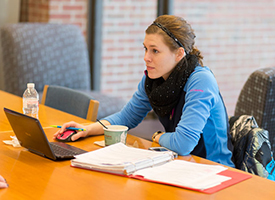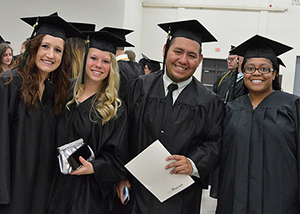Student retention continues at historic levels
 When Debbie Ford took over as chancellor in August 2009, she remembers some in the community saying that the university was not retaining enough of the students who enrolled. Those comments confirmed what Ford already knew: "When I first explored the opportunity at Parkside, I saw the retention numbers and I knew we could do better," Ford said. "One of our strategic goals is sustainable growth, which can only happen with strong retention. We will grow, and we will grow with a foundation of long-term student success."
When Debbie Ford took over as chancellor in August 2009, she remembers some in the community saying that the university was not retaining enough of the students who enrolled. Those comments confirmed what Ford already knew: "When I first explored the opportunity at Parkside, I saw the retention numbers and I knew we could do better," Ford said. "One of our strategic goals is sustainable growth, which can only happen with strong retention. We will grow, and we will grow with a foundation of long-term student success."
Historically, the university has been one of the most diverse in the UW System, reflecting the diversity of southeastern Wisconsin. More detailed data show that first-year to second-year retention for first-time, full-time African American and Hispanic students reached 75 percent.
"Part of the reason we are so encouraged by the positive trend in retention is our student demographic," said Troy Moldenhauer, UW-Parkside director of admissions and recruitment. "The majority of our students, and this goes back to when the university was founded, are the first in their families to attend a college or university. And, many of our students are personally responsible for the cost of their education. Nationally, retention is lower for these two groups; they tend to have more life experiences that pull them away from earning the degree."
Moldenhauer knows that retention improvement is a team effort starting with the acceptance of applicants. "We have become more selective because we better understand the profile of students who succeed here," Moldenhauer said. "And we've created new pathways, including partnerships with two-year institutions, that offer students more opportunities for success."
Moldenhauer and his team of recruiters personally contact students who are not admitted to UW-Parkside and discuss their options. "We want students to understand that there is more than one clear path to Parkside, and more than one successful road to graduation," he said.
Across the country, most students choose a university, and stay at a university, based on the institution's academic offerings. New programs at UW-Parkside, including a major in elementary education, and certificate programs in sales and global skills, prepare students to answer the talent demands of the region.
"A lot of our success has to do with telling our story," Ford said. "Close to 100 percent of our computer science students are employed immediately following graduation. For decades, 90 percent of our pre-health and pre-med students have been accepted to the professional schools and medical schools of their choice. Our AACSB-accredited business program offers students the opportunity to work on today's business challenges through the Ralph Jaeschke Solutions for Economic Growth Center.
"The student success stories are there; we're telling those stories and people are paying attention because they realize an amazing and relevant education is right here – why not take advantage of that opportunity?"

Strong retention translates to more graduates. The spring 2015 graduating class was the largest in the history of the university. More students graduated from UW-Parkside in the past five years than during any previous five-year period. Based on student surveys, UW-Parkside officials expect the retention and graduation trend to continue.
The 2015 Beginning College Survey of Student Engagement (BCSSE) reported an increase in the number of students who indicated that UW-Parkside was their first- or second-choice institution. The survey also showed a 30-percent increase (compared to 2011) of students who indicated that they expect to graduate from UW-Parkside.
Another key to sustained future success, Ford said, is the ability and flexibility of the university to adapt to the changing demands of students, especially adult learners. "We're seeing more interest from adult learners – many with a substantial number of college credits," Ford said. "We want to fulfill their need to enhance their skills. We're working on innovative programs to better meet their expectations within the time constraints of their busy schedules."
Southeastern Wisconsin is one of most dynamic economic regions in the state. The demand for talent will match or exceed that growth. The mission and vision of UW-Parkside is to meet today's talent needs and be prepared to meet the needs of tomorrow. Innovative learning programs, education partnerships, and high-demand academic programs strengthen the university's position as a talent resource for southeastern Wisconsin and beyond.